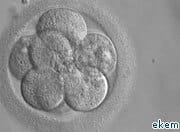A Scottish fertility clinic could soon allow women to genetically screen their unborn children and discard those with defects.
However, the controversial scheme has drawn criticism as a further step towards the creation of designer babies.
Doctors at the Glasgow Centre for Reproductive Medicine (GCRM) claim that the genetic screening of IVF embryos would lessen the risk of miscarriage and conditions such as Down’s syndrome which are more likely for babies carried by older women.
Embryos
But Pandora Summerfield, Director of the support group Down’s Syndrome Scotland, said: “Selecting out embryos with Down’s syndrome is not acceptable. This takes us into the realms of designer babies.”
She added: “For many parents a diagnosis of Down’s is a shock, but when they have their baby they find it a joy and a delight and they wouldn’t change it.”
Her concerns were echoed by Peter Kearney, spokesman for the Roman Catholic Church in Scotland, who said: “Such processes are less about medical progress, with the aim of helping people with a disability, and are more about a policy of hunt and destroy any person who is not considered perfect.
“Humanity is called to protect and serve the most vulnerable in society.
Equality
“In an age where equality is enshrined in law it seems ironic that such ideals are not extended to all human beings, before and after birth.”
License
But Dr Marco Gaudoin, Medical Director at the GCRM, defended the scheme, saying: “Ageing is linked to having abnormal embryos, for example those with Down’s syndrome and those at risk of miscarriage.
“We have the technology and we are hoping to offer this technique here as a Scotland-wide service.
“It will be suitable for women who are having repeated miscarriages and for older women who are more at risk of having abnormal eggs.”
The fertility clinic is currently applying for a licence to carry out the procedure.
Destroy
Under the macabre scheme embryos created by IVF would have a single cell extracted from them which would then be screened for any genetic abnormalities.
Embryos which were found to have abnormalities would be rejected, and only eggs deemed to be ‘normal’ would be implanted in the mother.
Earlier this year the UK’s fertility regulator unveiled a list of 116 different conditions for which doctors can destroy embryos conceived through IVF.
The controversial list includes a number of conditions which are considered minor, non life-threatening or medically treatable.
Scrapped
Earlier this week it was revealed that the HFEA was set to be scrapped by the Government as part of moves to slim down public spending.
The HFEA, which has been in existence since 1991, will continue in its current state for the moment but its functions will be moved to other bodies before the next General Election.
The fertility regulator came under fire in 2008 for sanctioning animal-human embryo research before Parliament had legislated for it.



